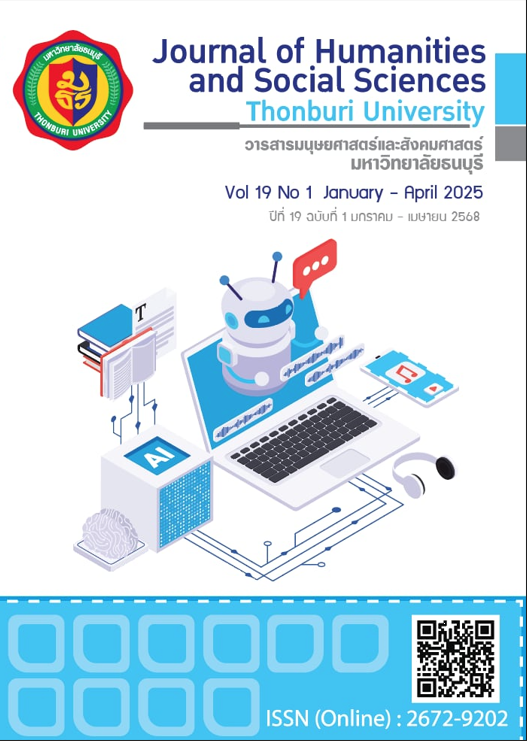Management and Adaptation in Crisis Situations Across Different Generations in Bangkok Based on the PESTEL Framework
Keywords:
Management, Adaptation, Crisis, GenerationsAbstract
This research aims to 1) study different age groups in each age range regarding management and adaptation during crises using the PESTEL framework, and 2) analyze the factors within each dimension of PESTEL that affect management capabilities and crisis adaptation. The research employs a quantitative research design. The population for this study consists of residents of Bangkok, with a sample size of 385 people, divided into Baby Boomers (98 people), Generation X (111 people), Generation Y (105 people), and Generation Z (71 people). The study's findings indicate that different age groups have varying capabilities in managing and adapting during crises. A comparison of the average crisis management capabilities among the different age groups shows that Baby Boomers have significantly different average adaptation capabilities compared to the other three groups. Regarding the analysis of the regression equations of independent variables with crisis management, four factors were found to be relevant: political factors, economic factors, environmental factors, and legal factors. When analyzing the regression equations of independent variables with crisis adaptation, four factors were identified: political factors, economic factors, social factors, and legal factors.
References
สำนักงานสถิติแห่งชาติ. (2567) สืบค้นเมื่อ 1 พฤษภาคม 2567, จาก http://statbbi.nso.go.th/staticreport/page/sector/th/03.aspx
Aguilar, F. J. (1967). Scanning the Business Environment. New York: Macmillan.
Barton, L. (1993). Crisis in Organizations: Managing and Communicating in the Heat of Chaos. Cincinnati: South-Western Publishing.
Chiam, J. C. S., & Lim, T. W. (2021). Coping with unrest in the periphery of China: Comparative case studies of Thailand, Myanmar and HKSAR. China and the World, 4(2), 2150008. World Scientific. Retrieved from https://www.worldscientific.com/doi/abs/10.1142/S2591729321500085
Engeström, Y., & Sannino, A. (2021). From mediated actions to heterogeneous coalitions: Four generations of activity-theoretical studies of work and learning. Mind, Culture, and Activity, 28(1), 4-23. https://doi.org/10.1080/10749039.2020.1806328
Fink, S. (1986). Crisis Management: Planning for the Inevitable. New York: AMACOM.
Garai-Fodor, M. (2022). The impact of the coronavirus on competence from a generation-specific perspective. Acta Polytechnica Hungarica, 19(8), 111-125. Retrieved from http://epa.niif.hu/02400/02461/00124/pdf/EPA02461_acta_polytechnica_2022_08_111-125.pdf
Johnson, G., Scholes, K., & Whittington, R. (2008). Exploring Corporate Strategy: Text and Cases. 8thed. Harlow: Financial Times Prentice Hall.
Lazarus, R. S., & Folkman, S. (1984). Stress, Appraisal, and Coping. New York: Springer Publishing Company.
Masten, A. S. (2001). Ordinary Magic: Resilience Processes in Development. American Psychologist, 56(3), 227-238.
Mitroff, I. I. (2005). Why Some Companies Emerge Stronger and Better from a Crisis: 7 Essential Lessons for Surviving Disaster. New York: AMACOM.
Tuli, F. A., & Vadiyala, V. R. (2022). Crisis management in South East Asia's tourism industry: Resilience and adaptation strategies. Global Disclosure of Economics and Business, 11(1), 35-48. Retrieved from https://www.researchgate.net/profile/Vishal-Reddy-
Weick, K. E., & Sutcliffe, K. M. (2001). Managing the Unexpected: Assuring High Performance in an Age of Complexity. San Francisco: Jossey-Bass.
Translated Thai References
National Statistical Office of Thailand. (2024). Retrieved May 1, 2024, from http://statbbi.nso.go.th/staticreport/page/sector/th/03.aspx (in Thai)
Downloads
Published
How to Cite
Issue
Section
License
Copyright (c) 2024 vutti watcharodomprasert

This work is licensed under a Creative Commons Attribution-NonCommercial-NoDerivatives 4.0 International License.
ผลงานที่ปรากฎในวารสารฉบับนี้เป็นลิขสิทธิ์เฉพาะส่วนบุคคลของผู้เขียนซึ่งต้องรับผิดชอบต่อผลทาง กฎหมายที่อาจเกิดขึ้นได้และไม่มีผลต่อกองบรรณาธิการ






